|
July 17, 2001 - Word of the Day: Exegesis
Dictionary.com's word of the day refers to a concept which Philip K. Dick was intimately familiar.
exegesis \ek-suh-JEE-sis\, noun; Exegesis comes from Greek, from exegeisthai, "to explain, to interpret," from ex-, "out of" + hegeisthai, "to lead, to guide." Thus an exegesis is, at root, "a leading or guiding out of" a complexity.
"It is a fiercely argued exegesis of Shakespeare's plays in the tradition of Samuel Johnson, Hazlitt and A. C. Bradley, a study that is as passionate as it is erudite."
"These are tightly argued, crisp exercises in literary and cultural exegesis which make perfectly clear the brilliant patterns of language and oftentimes strained analogic thinking of the poets."
"No variety of love is too trivial for exegesis. No aspect of love is so ridiculous that it hasn't been exhaustively reviewed by the great thinkers, the great artists, and the great hosts of daytime talk shows."
"Their works are the subject of innumerable analyses, exegeses, seminars, and doctoral theses." |
|
July 11, 2001 - Psycho Warfare: The Feds Want to Zap Your Brain From Space
For most people, the mere mention of the Star Wars missile defense system recalls memories of wackos in the Reagan years. If only. Today, beneath all the scientific and military gobbledygook are programs that will make the H-bomb obsolete, replacing it with "nonlethal" electromagnetic zaps from the ionosphere designed to take out an enemy's entire communication system, change weather patterns by turning sunny skies into torrential downpours, and drive you literally crazy by shooting sounds into your head. Part of the High-Frequency Active Aural Research Program, or HAARP, this latest theoretical weapon shoots a zapping electromagnetic beam into the ionosphere, where it becomes superheated before being steered back to earth. The Pentagon claims this research will improve our communication system, but the technology could also be aimed at adversaries, domestic or foreign.
|
|
July 9, 2001 - New Cautions Over a Plant With a Buzz
This report from the New York Times is very similar to the drug in Philip K. Dick's fictional JJ-180 or the drug that the Martian aboriginal inhales in his novel Martian Time Slip: "An obscure hallucinogenic herb from Mexico is gaining a toehold in the world of recreational drugs, prompting law enforcement officials to increase their scrutiny of the plant, which is legal, and moving health experts to issue cautions about the drug, whose jarring effects are not fully understood. The herb, Salvia divinorum, is a type of sage plant that can cause intense hallucinations, out-of-body experiences and, when taken in higher doses, unconsciousness and short-term memory loss. Users have also reported sensations of traveling through time and space, assuming the identities of other people and even merging with inanimate objects. "
|
|
May/June, 2001 - Literary Magazine Runs Controversial Cover Story on Philip K. Dick
|
|
July, 2001 - Biotech Advances May Alter Army Soon
Breaking the jungle silence, an alarm in her wristwatch goes off, detecting the presence of a toxic chemical agent. The visor on her helmet drops down, and the uniform that monitors her vital signs administers the drugs necessary to keep her safe and enable her to complete her mission. It's science fiction so far. But a study performed for the Army says advancements in biotechnology may soon turn such fiction into fact.
|
|
July 4, 2001 - Tampa Scans the Faces in Its Crowds for Criminals
"Camera shy? Then steer clear of Tampa's nightlife district. The Tampa Police Department has placed three dozen security cameras with face-recognition software in a downtown district popular with locals and tourists. Now, everyone who visits the district, Ybor City, for a burger or a beer runs the risk of having his face digitally scanned and the noses, cheeks and chins checked against a mug-shot database of murderers, drug dealers and other criminal suspects with arrest warrants."
|
|
June 18, 2001 - Are Religious Experiences Just a Side Effect of Brain Chemistry?
Here's a story reported in the International Herald Tribune that undoubtedly would have interested Philip K. Dick:
Using powerful brain imaging technology, researchers are exploring what mystics call nirvana and what Christians describe as a state of grace. Scientists are asking whether spirituality can be explained in terms of neural networks, neurotransmitters and brain chemistry. |
|
June 15, 2001 - Square fruit stuns Japanese shoppers
From the BBC News: "Japan has again shown off one of its greatest innovations - square watermelons. For years consumers struggled to fit the large round fruit in their refrigerators. And then there was the problem of trying to cut the fruit when it kept rolling around. But 20 years ago a forward-thinking farmer on Japan's south-western island of Shikoku solved the problem. The farmer, from Zentsuji in Kagawa prefecture, came up with the idea of making a cube-shaped watermelon which could easily be packed and stored. "
|
|
May 1, 2001 - Development of Chat Robots Help Make Fictional Worlds of Philip K. Dick A Reality
|
|
May, 2001 - Paul Williams' Book Sheds Light on PKD's Contributions to Modern Culture
Here's the beginning of the chapter for your enjoyment: Chapter #9: Martian Time-Slip (published 1964) by Philip K. Dick
|
||
|
April 16, 2001 - Michael Marshall Smith Wins PKD Award
The awards were presented at Norwescon 24 in SeaTac, Wash. The award is named for legendary SF author Philip K. Dick and is jointly sponsored by the Philadelphia Science Fiction Society and the Northwest Science Fiction Society.
|
||
|
April 19, 2001 - Making HAL Your Pal
Yudkowsky, a 21-year-old researcher at the Singularity Institute, has spent the last eight months writing an essay that's half precaution, half thought exercise, and entirely in earnest. This 750 KB treatise, released Wednesday, is not as much speculative as predictive. If a computer becomes sufficiently smart, the argument goes, and if it gains the ability to harm humans through nanotechnology or some means we don't expect, it may decide it doesn't need us or want us around. One solution: Unconditional "friendliness," built into the AI as surely as our genes are coded into us.
|
||
March 27, 2001 - Huge Gaping Holes in the Foundations of Mathematics
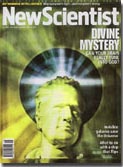
One of the profound questions about mathematics - and in some sense about reality - is whether we discover it or make it up. Do mathematical theorems exist in the ether as eternal truths waiting for us to stumble upon them or do we invent them in our fevered imaginations. Mathematician Gregory Chaitin has done some thinking about this, cleverly standing on the shoulders of giants to give him the panoramic view. He has proven that an infinite number of mathematical facts exist - seemingly resolving the question. But he also proved that these mathematical facts are entirely random, totally unrelated to one other. If mathematicians find any relationships, they do so by luck - "math is true by accident". Now, here's the kicker. Gregory's discovery basically means that any theory of reality - the holy grail of physics, the Theory of Everything - will never be mathematically consistent. These two links tell the story of Gregory's uncomputable number, Omega, how it blows huge holes in the whole of mathematics, and how it places fundamental limits on what can be known about reality. Think about that next time you cross the street.
|
||
|
Feb 5, 2001 - Face Spying at the Super Bowl
Those of you who follow the evolution of privacy policy in our society will be interested in this LA Times story. Apparently, the crowd at this year's Super Bowl was scanned with automated face recognition technology. As people entered the turnstiles, cameras digitally photographed them and the photos were compared against a database of known felons and terrorists in real time. The article quotes law enforcement sources as saying that the camera identified 19 people with criminal histories, "none of them of a 'significant' nature".
|
||
|
January 24, 2001 - Two New Books About Philip K. Dick Available
What If Our World Is Their Heaven : The Final Conversations With Phillip K. Dick - Gwen Lee and Elaine Sauter's interviews with PKD just months before his death. Here's the description from Amazon.com: "In November of 1981, four months before the author's death, journalist Gwen Lee recorded the first of several in-depth discussions with Philip K. Dick. The subjects touched upon included the specifics of his writing process, his enthusiastic response to the scenes and trailers he'd seen of Blade Runner (he never lived to see the finished film), and accounts of his religious experiences. But the greatest amount of time was devoted to discussions of his next novel, Owl in Daylight, a book he would never get the chance to write. A tale steeped in mysticism, biotechnology, and the relationship between music and language, it was to be his masterpiece. These extraordinary interviews are filled with the wit and aplomb characteristic of Dick's writing, helping make What If Our World Is Their Heaven? not only an engaging read, but a unique and compelling historical document. It will be a must read for anyone interested in the field of science fiction."
|
|
January 2001 - - Philip K. Dick Award Nominees Announced
The judges of the 2000 Philip K. Dick Award and the Philadelphia SF Society announced the six works that make up the final ballot for the award, which will be presented April 13 at Norwescon 24 in Seattle. The Philip K. Dick Award honors a distinguished science fiction book published for the first time in the United States as a paperback original. The award is sponsored by the Philadelphia Science Fiction Society, and the award ceremony is sponsored by the NorthWest Science Fiction Society. The complete list of nominees follows:
Visit the Norwescon 24 web site. |
||||||
|
December 27, 2000 - The Persistence of George W. Bush, Jr.
"First, don't panic. There is probably a good explanation for the mystery of the photographs, something that does not threaten the enslavement and/or extermination of mankind. There has to be a benign explanation. I just haven't found it yet." |
||||||
|
January 1, 2001 - Upcoming PKD Documentary Gets Three and a Half Star Review from Film Threat
|
||||||
|
January 4, 2001 - NASA'S CASSINI LISTENS TO EERIE NEW SOUNDS OF SPACE NEAR JUPITER
http://www.jpl.nasa.gov/cassini/acoustic/ Cassini's radio and plasma wave science instrument detected the waves at low radio frequencies, which University of Iowa scientists have converted to sound waves to make the patterns audible. The waves from which the new audio clip was developed were in the thin solar wind of charged particles that fills the space between the Sun and its planets. Cassini detected the waves Jan. 1 at a distance of 10 million kilometers (6.2 million miles) from Jupiter. |
||||||
|
December 16, 2000 - GANYMEDE TAKEOVER: Solar System's Largest Moon Likely Has A Hidden Ocean
Add Jupiter's moon Ganymede, which is bigger than two of the solar system's nine planets, to the growing list of worlds with evidence of liquid water under the surface. A thick layer of melted, salty water somewhere beneath Ganymede's icy crust would be the best way to explain some of the magnetic readings taken by NASA's Galileo spacecraft during close approaches to Ganymede in May 2000 and earlier, according to one new report.
|
||||||
|
||||||
|
December 1, 2000 - Two Philip K. Dick Soundtracks Available at MP3.com
Although he wasn't a musician he loved music and Phil Dick's fiction inspired artists of all medium. These two soundtracks available for listening and purchase at MP3.com are testament to the artistic merits of PKD's science fiction.
|
||||||
|
November 20, 2000 - Elvis Simulacra Brings King Back to Life
Here's a true story foreseen by Philip K. Dick in his 1972 novel We Can Build You. In the story, a team of inventors create an android replica of Abraham Lincoln who acts and thinks independently, complete with stubborn personality.
|
||||||
|
November, 2000 - Twelve Monkeys hit again: Disease Data Stolen in Lab Break-In
Life is information . . . NEW DELHI--The hard drives of nine computers, containing epidemiological data gathered from around India, have been stolen from the Indian Council of Medical Research. The missing data, stored on personal computers in the council's Epidemiological and Communicable Diseases unit, include published and unpublished information collected by 16 regional centers on the incidence of AIDS, malaria, tuberculosis, and other killers. Health officials say they have no idea who stole the drives, or for what purpose. (as reported by Science Online magazine) |
||||||
|
November, 2000 - Science Fiction legend Philip K. Dick comes to life in
The Gospel According to Philip K. Dick
from First Run Features in early Spring 2001
Fans are encouraged to sign up on the Gospel According to PKD Mailing List for a special offer when the video and DVD are available.
|
philipkdick.com News Archives
|
- Click here to return to philipkdick.com
- Click here to return to Philip K. Dick News
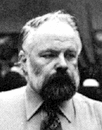 Entitled "Marxist Literary Critics Are Following Me!", the literary magazine Lingua Franca ran a story about how Philip K. Dick betrayed his academic admirers to the FBI. These claims have raised concerns among PKD fans who allege that they are unfounded. Decide for yourself . . .
Entitled "Marxist Literary Critics Are Following Me!", the literary magazine Lingua Franca ran a story about how Philip K. Dick betrayed his academic admirers to the FBI. These claims have raised concerns among PKD fans who allege that they are unfounded. Decide for yourself . . .
 WEST LAFAYETTE, Ind. (AP) - Trudging through a thick, muggy jungle, the
soldier remains cool, her body temperature precisely controlled by her
uniform.
Incapable of seeing more than 10 feet ahead, she is guided through an
earpiece in her helmet by someone at base camp who can trace her because a
biomarker was in a nutrition bar she ate earlier.
WEST LAFAYETTE, Ind. (AP) - Trudging through a thick, muggy jungle, the
soldier remains cool, her body temperature precisely controlled by her
uniform.
Incapable of seeing more than 10 feet ahead, she is guided through an
earpiece in her helmet by someone at base camp who can trace her because a
biomarker was in a nutrition bar she ate earlier.
 This report from the New York Times Technology section ias eerily reminiscient of PKD's Minority Report:
This report from the New York Times Technology section ias eerily reminiscient of PKD's Minority Report:
 As if seedless melons weren't enough. Here's a truly bizarre story that would have made Phil Dick proud.
As if seedless melons weren't enough. Here's a truly bizarre story that would have made Phil Dick proud.
 San Francisco, CA - Fifty one years ago the mathematician and Enigma codebreaker Alan Turing proposed his famous "test" for artificial intelligence-whether a machine could imitate a woman in an instant messaging style scenario. Ten years ago the philanthropist Hugh Gene Loebner initiated the first annual real-life version of the Turing Test (www.loebner.net). Last year, A.L.I.C.E. (Artificial Linguistic Internet Computer Entity) won the Loebner Prize. She was ranked "most human computer" by a panel of judges including linguists, philosophers, psychologists and writers. This year several AIML (Artificial Intelligence Markup Language) chat robots are expected to enter the competition, to be held at the London Science Museum on October 13, 2001.
San Francisco, CA - Fifty one years ago the mathematician and Enigma codebreaker Alan Turing proposed his famous "test" for artificial intelligence-whether a machine could imitate a woman in an instant messaging style scenario. Ten years ago the philanthropist Hugh Gene Loebner initiated the first annual real-life version of the Turing Test (www.loebner.net). Last year, A.L.I.C.E. (Artificial Linguistic Internet Computer Entity) won the Loebner Prize. She was ranked "most human computer" by a panel of judges including linguists, philosophers, psychologists and writers. This year several AIML (Artificial Intelligence Markup Language) chat robots are expected to enter the competition, to be held at the London Science Museum on October 13, 2001.

 Michael Marshall Smith's novel Only Forward, published by Bantam Spectra, won the Philip K. Dick Award for distinguished science fiction, given to a 2000 book published for the first time in the United States as a paperback original. Smith won a certificate and a check for $1,500. Evolution's Darling by Scott Westerfeld, published by Four Walls Eight Windows, received a special citation honor.
Michael Marshall Smith's novel Only Forward, published by Bantam Spectra, won the Philip K. Dick Award for distinguished science fiction, given to a 2000 book published for the first time in the United States as a paperback original. Smith won a certificate and a check for $1,500. Evolution's Darling by Scott Westerfeld, published by Four Walls Eight Windows, received a special citation honor.
 Eliezer Yudkowsky has devoted his young life to an undeniably unusual
pursuit: planning for what happens when computers become far smarter than us.
Eliezer Yudkowsky has devoted his young life to an undeniably unusual
pursuit: planning for what happens when computers become far smarter than us.

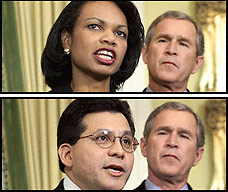 Is this man a simulacra? Find out more from this incredible deduction about the President-Elect. From the Washington Post:
Is this man a simulacra? Find out more from this incredible deduction about the President-Elect. From the Washington Post:
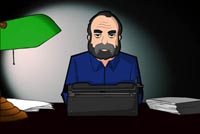 " . . .as fascinating and unnerving as any of Dick's fiction . . . The animated segments, as well as a pulsating sci-fi soundtrack, evoke a tone of paranoia that seems to mirror Dick's worldview. "Gospel" is clearly a labor of love, designed to appeal to fans and novices alike. "
" . . .as fascinating and unnerving as any of Dick's fiction . . . The animated segments, as well as a pulsating sci-fi soundtrack, evoke a tone of paranoia that seems to mirror Dick's worldview. "Gospel" is clearly a labor of love, designed to appeal to fans and novices alike. "
 One audio clip produced from radio waves that NASA's Cassini spacecraft detected near Jupiter was described last week by the Los Angeles Times as sounding "like a troop of howler monkeys battling underwater." A new audio clip is available online today from NASA's Jet Propulsion Laboratory:
One audio clip produced from radio waves that NASA's Cassini spacecraft detected near Jupiter was described last week by the Los Angeles Times as sounding "like a troop of howler monkeys battling underwater." A new audio clip is available online today from NASA's Jet Propulsion Laboratory:
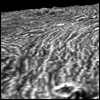 No giant worms yet but this was recently reported by NASA's Jet Propulsion Laboratory:
No giant worms yet but this was recently reported by NASA's Jet Propulsion Laboratory:
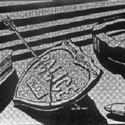
 Stockbridge, VT - Engineers at Advanced Animations have designed and built an animatronic Elvis for Madame Tussaud's wax museum in Las Vegas. Powering his 32 individual rhythmic moves is a bevy of pneumatic and hydraulic technologies. Elvis just wouldn't be Elvis without the trademark sneer and pelvic swivel, and engineers strived to make every move as realistic as possible. It's very different from designing cartoon characters, says Bob Crean, vice president of operations. "Cartoons aren't lifelike, nor would anyone want them to be. With a figure as high-profile as Elvis, we couldn't take any chances."
Stockbridge, VT - Engineers at Advanced Animations have designed and built an animatronic Elvis for Madame Tussaud's wax museum in Las Vegas. Powering his 32 individual rhythmic moves is a bevy of pneumatic and hydraulic technologies. Elvis just wouldn't be Elvis without the trademark sneer and pelvic swivel, and engineers strived to make every move as realistic as possible. It's very different from designing cartoon characters, says Bob Crean, vice president of operations. "Cartoons aren't lifelike, nor would anyone want them to be. With a figure as high-profile as Elvis, we couldn't take any chances."